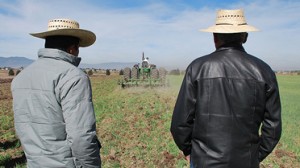The launch of the STEPS Centre China Sustainability Hub in Beijing last week provided a useful platform for participants at the Pathways to Sustainability in a Changing China conference and its associated Masterclass to engage with current activities at the soon-to-be-launched Latin America and Africa regional hubs of the emerging Pathways to Sustainability Global Consortium.
Researchers from Fundacion Cenit in Buenos Aires, which hosts STEPS America Latina, and the African Centre for Technology Studies (ACTS) in Nairobi, which coordinates the networked Africa hub with partners including ATPS and SEI Africa, have long-established relationships with their STEPS counterparts in the UK grounded in joint research on innovation, agriculture and energy.
But it was the resonance of ideas across and between Latin America, Africa and China that provided fascinating food for thought in Beijing. Joel Houdet of ACTS and Anabel Marin of Cenit offered useful insights for a fruitful discussion and exchange of ideas about potential collaborations on a South-South basis linking the three regions.
Cenit’s Sustainability Hub may not officially launch until November but that hasn’t stopped the dynamic group organising multiple activities not only around research project but also wider engagement, media and communication work. Particularly, STEPS America Latina has been developing diverse projects and activities to explore and articulate alternative sustainability pathways. For Marin, the establishment of the hub comes at a perfect time, renewing and opening the region’s development agenda and creating space for discussions and interactions among actors as well as actions to develop alternative visions.
While the situation has improved for many Latin American countries and efforts towards social inclusion are progressing, problems remain, she explained. These include: few commodities to export with impacts on national balances of payment; equal income distribution; and issues of economic and technological dependencies. At the same time, science and technology has become central to policy agendas. This is a new development compared to previous governments’ exclusive focus on neo-liberal approaches,she said, even if the dominant view remains on growth as the main driving force. Furthermore, the continent is facing new challenges, including food security, the destruction of national resources, industrial and agricultural pollution and associated public health impacts as well as climate change impacts and uncertainties. Copper, for example, accounts for 70% of Chile’s exports but requires considerable water and energy resources, leaving the country trapped, Marin explained.
Latin America’s long history of social movements is also a key area of interest and the hub pays a particular attention to how decisions are taken in conflicted contexts, placing trade-offs centre stage. It is involved in a wide range of research and engagement activities, including debates between various stakeholders, media activities, both online and in-print, as well as the development of new research projects and academic publications.
Monthly debates in Buenos Aires have in the past focused on a wide range of issues, including Intellectual Property Rights, innovation for social inclusion, fracking, open innovation and 3D printers. The hub also organised a workshop on “The future of seeds [and agriculture in Argentina]: technologies, actors and property rights”.
Meanwhile research projects are also broad, reflecting current sustainability challenges on the continent. These include the role of innovation movements such as grassroots innovation experiments, alternative forms of knowledge creation, power and knowledge, knowledge networks, productive transformations, the role of niches but also horizontal innovations. Researchers are also exploring other avenues on issues where the pathways to sustainability approach is particularly relevant such as “Buen Vivir” in Bolivia, mining in Chile, forests in Brazilian Amazonia or the use of GM Cotton.
Meanwhile, Joël Houdet provided insights into ACTS’ current activities. Created in 1998 by five countries, including Ghana, Kenya, Malawi, Uganda and Malta, the Centre is non-partisan research organisation, aiming to provide knowledge for “better livelihoods” through harnessing science, technology and innovation (STI) potentials for development in Africa. Currently, the organisation’s key research areas includes inclusive bio economy, information economy, climate resilient economies, responsible natural resources economies, gender youth and inclusive development as well as STI capacity building with an emphasis on the role and voices of the marginalised in harnessing STI development.
ACTS’s involvement with the STEPS Centre has particularly focused on activities surrounding low carbon economy pathways with a specific focus on energy innovations. And the organisation’s former Executive Director and current Kenyan Cabinet Secretary for Environment, Water and Natural Resources, Judi Wakhungu, was STEPS’ first Advisory Committee chair. While ACTS has a major regional focus on the African continent, the organisation is particularly interested developing further work with a South-South angle – such as its collaboration with India-based Energy and Resource Institute (TERI) – and in collaborations with other hubs in the the Pathways to Sustainability Global Consortium.
Throughout three-days of STEPS Centre events hosted by China hub coordinator Beijing Normal University School of Social Development and Public Policy notably prompted thoughts and discussions between representatives from China, Africa and Latin America, identifying common themes recurrent different contexts and providing scopes for mutual learning and comparative research. For example, prevalent policy discourses surrounding the “green economy” in Africa and ‘greenization’ under the New Normal in China offer interesting avenues for comparative approaches. Global concerns regarding seeds and agriculture and mining and corporate social responsibility also raise multiple sustainability issues across China, Latin America and Africa.
The launches of regional Sustainability Hubs – with Africa and Latin America holding launch events in June and November, respectively – as part of the new Pathways to Sustainability Global Consortium is particularly welcome at a time when the Millennium Development Goals are to be replaced by the Sustainable Development Goals and there is increasing interest in South-South cooperation, both in policy and practice.
Sandra Pointel is a Doctoral Researcher, SPRU Science Policy Research Unit, University of Sussex